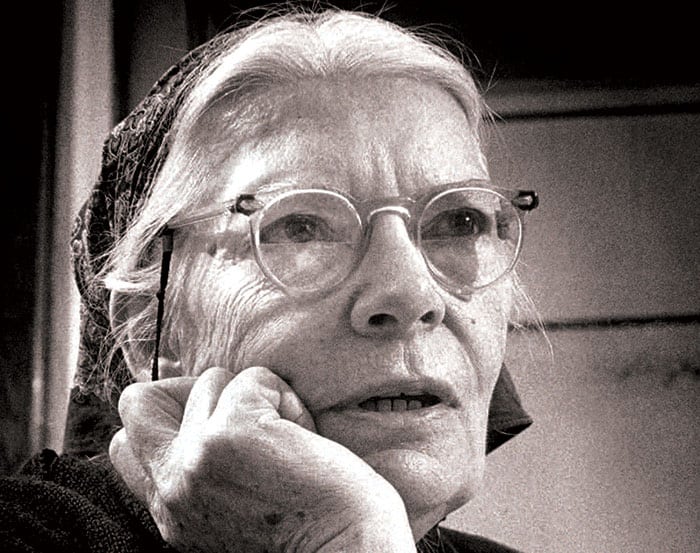
Courtesy Marquette University Archives
Dorothy Day and I go way back.
Granted, I never met her, but I can’t help but feel a connection
after volunteering every third Saturday for the past twenty years
at the Dorothy Day Center in downtown Saint Paul. I first went
there on a lark, something to try once because I had just moved to
the Twin Cities and wanted to meet new people. I never got around
to stopping.
The Dorothy Day Center is a refuge in the city, a place where
people can get hot meals, shelter, mental health services, and
medical care. I work with a team from Immanuel Lutheran Church
in Saint Paul that prepares the noon meal. Our menu never varies.
Every third Saturday, we serve sloppy joes, beans and franks, hardboiled
eggs, cookies, bananas, and milk.
We typically attract 250 to 300 people, mostly men but some
women and occasionally even children. Many are unemployed and
homeless; others have mental or physical challenges. I’ve talked
with people who live under bridges or camp among clumps of trees
along the interstate.
They may be wearing hand-me-downs or pushing their belongings
in shopping carts, but they never lose their sense of dignity.
They want to be treated with respect and courtesy, just like anybody
else. Dorothy Day would have expected no less.
But who exactly was Dorothy Day? Turns out, she doesn’t have
much to do with Saint Paul and probably never set foot here.
Dorothy Day was a rabble-rouser. Born in Brooklyn in 1897, she
was a critic of capitalism and a lifelong pacifist who opposed U.S.
involvement in World War II. She cofounded the Catholic Worker
Movement, which was committed to nonviolence, prayer, and serving
the poor. She believed in civil disobedience and was jailed many
times. Critics labeled her an anarchist and socialist; she called herself
a “Christian personalist.”
Above all, Dorothy Day believed in the teachings of scripture
and took a vow of poverty that she believed bound her to the poor,
homeless, sick, and desperate.
She was a fierce woman who could be intimidating and stubborn
at times. I know a woman who worked with Dorothy Day in
New York back in the 1960s and said she was deathly afraid of her.
Another volunteer who worked with Day described her as a tall
woman who looked as if she had been carved with an axe.
You wouldn’t disagree with that description if you saw the giant
black-and-white portrait of her that overlooks the lunchroom at
the Dorothy Day Center in Saint Paul. She has a stern, no-nonsense
look that seems to be saying, “Eat your peas or I’ll box your ears.”
Her face would be right at home on Mount Rushmore.
She made plenty of enemies during her remarkable life, but
she accomplished much and never let anyone get in the way of her
goals. She was a champion of the poor and wasn’t afraid to fight for them.
We could use a few more Dorothy Days today.